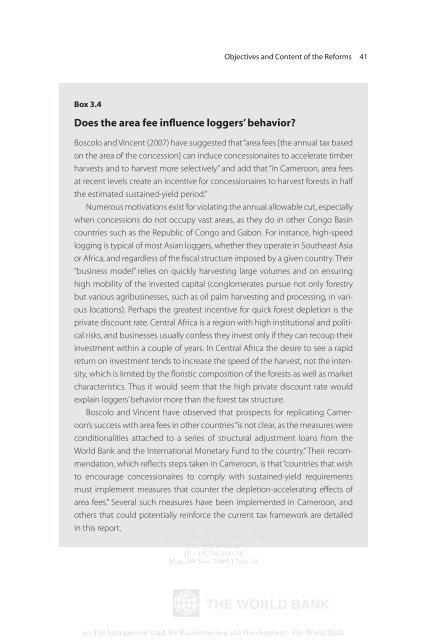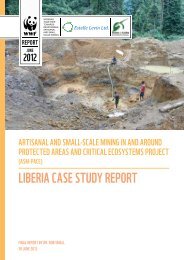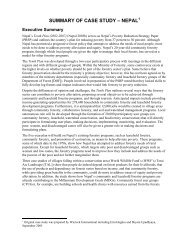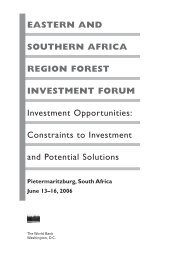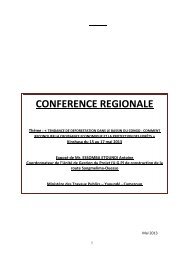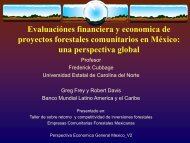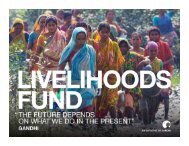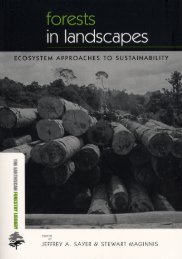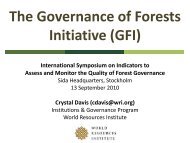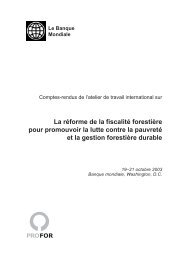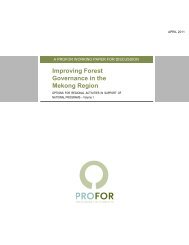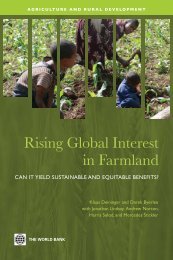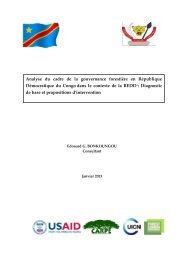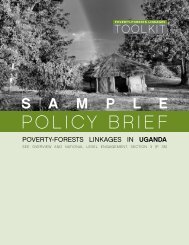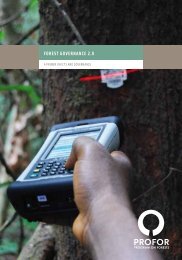The Rainforests of Cameroon - PROFOR
The Rainforests of Cameroon - PROFOR
The Rainforests of Cameroon - PROFOR
- No tags were found...
Create successful ePaper yourself
Turn your PDF publications into a flip-book with our unique Google optimized e-Paper software.
Objectives and Content <strong>of</strong> the Reforms 41Box 3.4Does the area fee influence loggers’ behavior?Boscolo and Vincent (2007) have suggested that “area fees [the annual tax basedon the area <strong>of</strong> the concession] can induce concessionaires to accelerate timberharvests and to harvest more selectively” and add that “in <strong>Cameroon</strong>, area feesat recent levels create an incentive for concessionaires to harvest forests in halfthe estimated sustained-yield period.”Numerous motivations exist for violating the annual allowable cut, especiallywhen concessions do not occupy vast areas, as they do in other Congo Basincountries such as the Republic <strong>of</strong> Congo and Gabon. For instance, high-speedlogging is typical <strong>of</strong> most Asian loggers, whether they operate in Southeast Asiaor Africa, and regardless <strong>of</strong> the fiscal structure imposed by a given country. <strong>The</strong>ir“business model” relies on quickly harvesting large volumes and on ensuringhigh mobility <strong>of</strong> the invested capital (conglomerates pursue not only forestrybut various agribusinesses, such as oil palm harvesting and processing, in variouslocations). Perhaps the greatest incentive for quick forest depletion is theprivate discount rate. Central Africa is a region with high institutional and politicalrisks, and businesses usually confess they invest only if they can recoup theirinvestment within a couple <strong>of</strong> years. In Central Africa the desire to see a rapidreturn on investment tends to increase the speed <strong>of</strong> the harvest, not the intensity,which is limited by the floristic composition <strong>of</strong> the forests as well as marketcharacteristics. Thus it would seem that the high private discount rate wouldexplain loggers’ behavior more than the forest tax structure.Boscolo and Vincent have observed that prospects for replicating <strong>Cameroon</strong>’ssuccess with area fees in other countries “is not clear, as the measures wereconditionalities attached to a series <strong>of</strong> structural adjustment loans from theWorld Bank and the International Monetary Fund to the country.” <strong>The</strong>ir recommendation,which reflects steps taken in <strong>Cameroon</strong>, is that “countries that wishto encourage concessionaires to comply with sustained-yield requirementsmust implement measures that counter the depletion-accelerating effects <strong>of</strong>area fees.” Several such measures have been implemented in <strong>Cameroon</strong>, andothers that could potentially reinforce the current tax framework are detailedin this report.Delivered by <strong>The</strong> World Bank e-library to:<strong>The</strong> World BankIP : 192.86.100.34Mon, 09 Nov 2009 17:06:18(c) <strong>The</strong> International Bank for Reconstruction and Development / <strong>The</strong> World Bank


